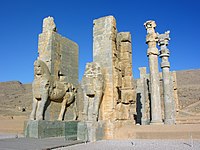User talk:Gligan/Archives/2006/December
| This page is an archive of past discussions. Do not edit the contents of this page. If you wish to start a new discussion or revive an old one, please do so on the current talk page. |
RE: Persia and Iran
Thank you for contacting me about a subject that is very interesting to me. Yes, in another way, Iranians are Persians. It's just that Reza Pahlavi, one of the Iranian kings decided that the west should use Iran (which was the name used by Iranians themselves from the foundation of Iran) instead of Persia (name used by Greeks). Persia itself is derived from the Persian word "Pars". (I'm not going to take your time on a subject that you already know of). Although, I do not think it was the right thing he (the king) did, because if that is the case, Germany should be call Deutchland around the globe. Iran is very often confused with Iraq, and is very very often misspelled by many as "I Ran" or "Iron", "E Ran", etc, while Persia is easy for people to spell. Plus people will not get confused about Persia as an ancient country which doesn't exist anymore. And in my opinion, Persia is a glamorous name. And about Cyrus and Darius, they are among the people Iranians are very proud of, specially these days in which many of Iranians do not like their government. ;-) If you have any questions, comments, etc, you're very welcome to leave a message. It was a pleasure answering you. --Arad 04:06, 3 December 2006 (UTC)
| History of Iran |
|---|
 |
|
Timeline |
- Hello again. About the name Fars (a Province of Iran), It's because after the Islamic Invasion of Persian, Arabs, who couldn't spell the letter "P" refered to Pars as Fars and Parsi as Farsi. (Same as many Iranian names such as Pyruz (Fyrus) etc.) I go now to the answer of questions. 1) If Parthia restored Persia or Sassanids? Parthians are Iranian people (not Persian but Parth. *Just a little history out of topic*: When Aryans settled down in the Iranian plateau, they were three groups. Medes, Parthians and Persians. That's the reason Iranians called their country Iran and not Persia (Parsa) as Persia belongs only to Persians and not Kurds, Lurs, Parths, Medes, etc who live in Iran* Ok back to the question, It was Parthians who restored Iran (Persia) after the conquest of Alexander (and Seleucid Empire). But, because Parthians were a confederation, of Provinces, the Empire, as it got bigger was harder to manage. So the Sassanids, who were Persian, wanted to reorganized the Empire by a Centralized state and they always wanted to show themselves as the continuance of Achaemenid Empire (as you can see they had carvings under the tombs of Darius the Great and other Persian Kings in Nagsh-e Rustam. So as conclusion, Parthians are Iranian (Persian in the western meaning). 2) If I agree with restoration of monarchy in Iran. Although, I would love to have a constitutional monarchy in Iran, we do not currently have a person of Royal blood of a dynasty of which we respect and love. As you probably know, dozens of dynasties have ruled in Iran in the past 7000 years (as you see the the template). But the only two dynasties, of which there is a hair to the thrown is the Qajar Dynasty (hated by majority of Iranians) and the Pahlavi Dynasty, which themselves were the cause of the Islamic revolution in Iran because of the oppression they had on Iranians (the last king wanted only one political group). So if ever Iran gained to freedom, personally i would hate to see someone who had done nothing for my country to become the king, and wasting the money of the population. So i think it's impossible for Iran to return to monarchy. But first we need democracy, then monarchy. I'll be happy to answer your other questions. Hope I hadn't took much of you're time. With the best wishes. --Arad 22:14, 5 December 2006 (UTC)
The Military history WikiProject Newsletter: Issue X - December 2006
The December 2006 issue of the Military history WikiProject newsletter has been published. You may read the newsletter, change the format in which future issues will be delivered to you, or unsubscribe from this notification by following the link. Thank you.
This is an automated delivery by grafikbot 22:43, 26 December 2006 (UTC)
